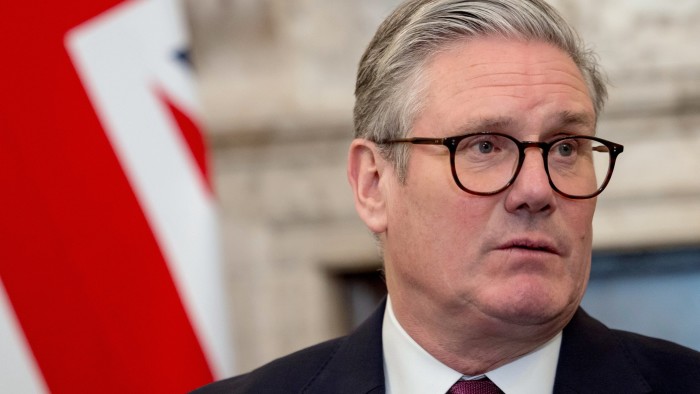Unlock the White House Watch newsletter for free
Your guide to what the 2024 US election means for Washington and the world
Sir Keir Starmer has told his cabinet to prepare for a new wave of US tariffs hitting the UK on Wednesday, but Downing Street believes he can still secure a trade deal that would leave Britain in a better position than the EU.
US officials have indicated President Donald Trump will at some point give Britain special treatment, partly because of Starmer’s willingness to water down a digital services tax that hits American tech companies.
Some business lobbyists involved in trade talks with Washington believe Britain could eventually face baseline tariffs of 10 per cent to 15 per cent, while the EU would have to pay equivalent tariffs of between 20 per cent and 25 per cent.
However, British officials admit that, in spite of a “term sheet” for a UK-US economic deal being ready, they expect Trump to impose tariffs on Britain on Wednesday. They say they do not know how the president will view the UK offer, what concessions he might make, and when he might agree a deal.
“It’s clear they want to treat us differently, either now or later,” said one British official briefed on the negotiations. A US official confirmed Britain would ultimately get lower reciprocal tariffs than the EU.
Starmer hopes he can secure a better deal because Britain has a broadly balanced trade relationship with the US. The UK premier speaks regularly to Trump; the pair most recently spoke on Sunday.
Britain has offered to scrap or scale back its digital services tax and has discussed cutting 20 per cent tariffs on some fish and seafood products deemed by the US government as being “high”.
Starmer has warned, however, that he will not dilute Britain’s food standards regime, a stance that blocks the import of chlorine-dipped chicken and hormone-treated beef.
The prime minister told the cabinet to expect bad news on tariffs when Trump announces his plans on Wednesday, or “liberation day”, but said talks on a possible trade deal would continue.
Business and trade secretary Jonathan Reynolds said it was “a very serious and significant moment” for the UK, with fears a trade war could cause severe economic disruption and lacerate Britain’s public finances.
Rachel Reeves, chancellor, spoke to her US counterpart Scott Bessent on Monday and updated the cabinet on the likely impact of US tariffs.
“The chancellor said that global tariffs will have an impact on the UK as an open trading economy and that securing a deal could mitigate some of those effects,” Downing Street said.
Reeves did not suggest a deal would exclude Britain from tariffs altogether. She and Starmer are adamant the UK should not immediately retaliate, fearing it could make the situation worse.
The Office for Budget Responsibility on Tuesday repeated a warning that Reeves’ fiscal headroom of £9.9bn could be obliterated if Trump unleashes a full-scale trade war.
US tariffs of 20 per cent to 25 per cent on UK goods would “knock out all the headroom the government currently has” if maintained for five years, OBR committee member David Miles told MPs.
Starmer is feeling political heat after spending months courting Trump diplomatically with relatively little to show for it. The Liberal Democrats said Starmer should form a “united front” with Canada and the EU against Trump’s trade war, “including retaliatory tariffs where necessary”.
Angela Rayner, deputy prime minister, insisted that indulging Trump was “in the national interest” and rejected as “ridiculous” suggestions that a historic second state visit for the US president should be cancelled.
Meanwhile, Reynolds denied US concerns about free speech in Britain had played any part in trade talks, saying such worries were being expressed by the state department rather than trade negotiators.
“It’s a very serious and significant moment,” he told the BBC. “That’s why we have been so resolute in pursuing our national interest and putting the UK in the best place of any country to navigate some of these pressures.”
Recommended
Ministers are drawing up plans to mitigate the fallout. Reynolds said on Tuesday that Britain would put in place anti-dumping measures to stop the UK being flooded with cheap goods diverted from the US market.
He said he was ready to impose quotas and tariffs on certain products to protect British companies from the dumping of heavily discounted products that had been destined for the US.
Britain already had in place quotas and 25 per cent tariffs on some steel and aluminium products, following Trump’s earlier announcement of US levies on the sector, Reynolds added.



